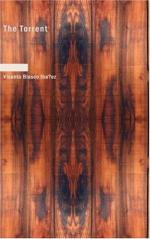Every Wednesday, which was market-day in Alcira and brought a great crowd of orchard-folk to town, the street where don Jaime lived was the busiest in the city. People came in droves to ask for renewal of their notes, each leaving a tip of several pesetas usually, not to be counted against the debt itself. Others, humbly, timidly, as if they had come to rob the grasping Shylock, would ask for loans; and the strange thing about it, as the malicious noted, was that all these people, after leaving everything they owned in don Jaime’s hands, went off content, their faces beaming with satisfaction, as if they had just been rescued from a danger.
This was don Jaime’s chief skill. He had the trick of making usury look like kindness; he always spoke of those fellows, those hidden owners of the money and the horses—heartless wretches who were “after him,” holding him responsible for the short-comings of all their debtors. The burdens he thus supposedly assumed won him a reputation as a kind-hearted soul, and such confidence was the wily old demon able to instill in his victims that when mortgages were foreclosed on homes or fields, many of the unfortunates despoiled, would say, resignedly:
“It’s not his fault. What could the poor man do if they forced him to it? It’s those other fellows who are sucking the blood of us poor folks.”
And so, quietly, leisurely, tranquilly, don Jaime got possession of a field here, then another there, then a third between the two; and in a few years he had rounded out a beautiful orchard of orange-trees with virtually no expenditure of capital at all. Thus his property went on increasing, and, with his radiant smile, his spectacles on his forehead and his paunch growing fatter and fatter, he could be seen surrounded by new victims, addressing them with the affectionate tu, patting them on the back, and vowing that this weakness he had for the doing of favors would some day bring him to dying like a dog in the gutter.
Thus he went on prospering. Nor was all the scoffing of city people of any avail in shaking the confidence reposed in him by that flock of rustics, who feared him as they feared the Law itself and believed in him as they believed in God.
A loan to a spendthrift eldest son made him the proprietor of the fine city mansion, which came to be known as “the Brull place.” From that date he began to hob-nob with the large real-estate owners of the city, who, though they despised this upstart, made a small place for him in their midst with the instinctive solidarity that characterizes the freemasonry of money. To gain a little more standing for his name, he became a votary of San Bernardo, contributed to the funds for church festivals, and danced attendance on the alcalde, whoever that “mayor” might be. In his eyes now, the only people in Alcira were such as collected thousands of duros, whenever harvest time came around. The rest were rabble, rabble, sir!




